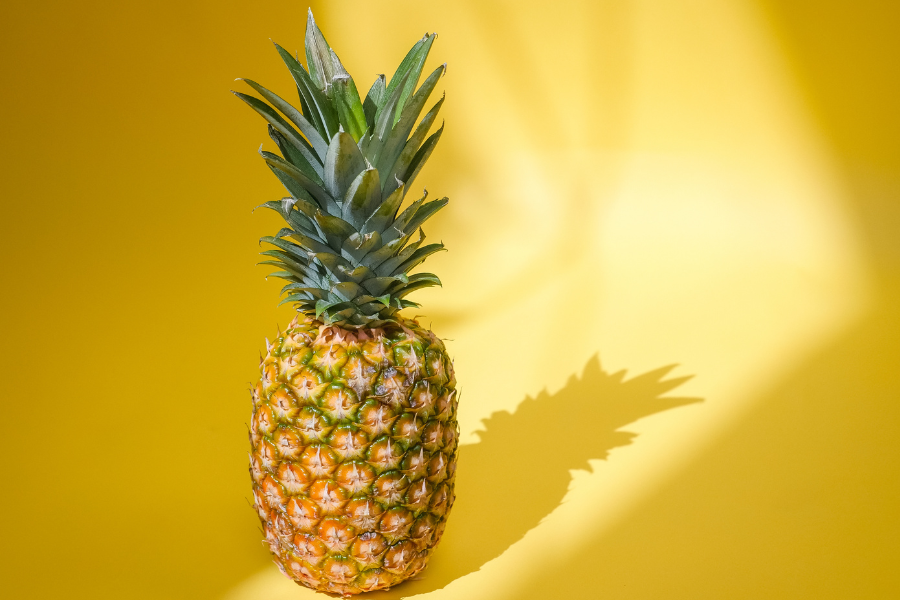Hola pup parents and pineapple lovers! Many of us pineapple enthusiasts, who are also dog owners have, at some point, wondered if we could share this sweet treat with our four-legged bffl (best friend for life). Well, you have come to the right place. Today, we are slicing and dicing into this topic to learn if dogs can, indeed, have pineapple.
For those skimmers out there who do not feel like reading this whole article, we feel you. Here are some key takeaways about sharing the sweet, juicy, tropical goodness with your pup:
- Dogs can can absolutely have pineapple, but just like with most fruits (for dogs) , it needs to be in moderation. When shared sparingly, this tasty treat can also pack a nutritional punch, as it's loaded with vitamins, minerals, and fiber.
- Fresh, raw pineapple is the wat to do it. It is better to go all natural and serve your pup fresh pineapple vs. canned, which can have added sugar, or even syrup.
- Portion Control is Key: As mentioned, moderation is keyyy! Only give a small amount of pineapple to your pooch (i.e. a couple chunks, not the full thing, not the serving size you would eat).
- Because pineapple has such a high water content, it can be both a tasty and refreshing and treat, especially on hot days.
- Always Remove the Skin and Core: These parts are tough to digest and could be harmful, so make sure to prepare the pineapple safely.
Can Dogs Eat Pineapple?
Yes, dogs can totally have pineapple! This tropical treat is not only safe for our four-legged pals but also packs a bunch of health benefits. However, like all good things in life, it comes with a "but." Pineapple should be served in moderation and prepared properly. Stick around to discover how to safely share this sweet snack with your pup!
Pineapple 101 for Pooches
Before we get into the juicy details, let's lay down some ground rules. The part of the pineapple that's a big yes for dogs is the soft, ripe inner fruit. The tough outer skin and the hard inner core? Not so much. Those parts are a choking hazard and can be pretty rough on their digestive system.
The Sweet Benefits
- Rich in vitamins! Pineapple is stacked with good-for-you (and you dog) vitamins like B6 and vitamin C, which can be a nice immune and energy booster!
- Minerals, and more than minerals: Pineapple contains both magnesium and potassium, minerals that are essential for optimal heart and muscle function.
- A hero of hydration: Because it contains soo much water, pineapple can both refresh and hydrate you, and your pooch - this can make it a perfect summer-afternoon treat.
- Fiber up, boys and girls!: Some chunks of pineapple can help digestion and keep your GI tracts operating smoothly, thanks to the fiber content.
Serving Suggestions
Now, how do you serve this tropical treat? First off, fresh pineapple is the way to go. Canned pineapple might be convenient, but it's often soaked in sugary syrup that's not doggo-friendly. Here's how to make pineapple the perfect pooch snack:
- Peel and Core: Remember, only the soft inner fruit gets the green light.
- Small Bites: Chop the pineapple into bite-sized pieces to prevent choking and make it easier for your dog to digest.
- Moderation is Key: Start with a small amount to see how your pup reacts. Too much of this sugary snack can lead to an upset stomach.
When Pineapple Isn't Paw-fect
While pineapple is generally safe, it's not suitable for all dogs. Here are a few situations when pineapple might not be the best choice:
- Allergies: Just like humans, dogs can have allergies. If it's your dog's first pineapple rodeo, keep an eye out for any allergic reactions.
- Diabetes or Weight Issues: Due to its natural sugars, pineapple might not be ideal for dogs with diabetes or weight problems. Always consult your vet first.
- Digestive Sensitivities: Some dogs might find pineapple a bit too adventurous for their tummy. If your dog has a sensitive stomach, it's best to give this treat a pass.
A Closer Look at Sugar and Enzymes in Pineapple
Alright, folks, while we've been singing praises about the wonders of pineapple for our furry companions, there's a little bit more to the story. You see, as much as we love this juicy treat, it's packed with natural sugars and contains an enzyme known as bromelain. Now, don't get us wrong, bromelain has its perks, like helping with protein digestion, but it's the sugar content we need to chat about.
Sweet Talk on Sugar
Even though it's natural, the sugar in pineapple can be a bit of a hiccup for dogs, especially if they're enjoying it as a frequent snack. Too much sugar, even from fruit, can lead to some not-so-sweet outcomes like weight gain or even diabetes over time. We all want to keep our pups in tip-top shape, so it's crucial to keep those pineapple treats rare and small.
Enzyme Insights
So let's talk more about bromelain. Some of you may have heard of it - as it's actually now a supplement that can aid human digestion. Its role is to help the body break down proteins in food! Pretty cool, right? Beware, however, becuase for sensitive-tummy doggos, it may cause some GI distress. This doesn't mean pineapple your dog needs to avoid pineapple altogether, but it is absolutely something you should be mindful of.
The Pineapple-Canine Connection
Pineapple can be more than just a delicious treat. Sharing some slices of pineapple with your pooch be enjoyable for you and them. So whether you're using pineapple as a training treat, or just as a way to spoil your pup a little, it's a sweet addition to their diet.
FAQs Unpeeled
- Q: How often can dogs eat pineapple?
- A: Think of pineapple as an occasional treat. Depending on your dog's size and diet, a few small pieces once or twice a week should be enough to keep it special.
- Q: Can dogs have pineapple juice?
- A: It's best to avoid giving your dog pineapple juice, especially store-bought ones, as they can contain added sugars and preservatives.
- Q: What if my dog doesn't like pineapple?
- A: No biggie! Dogs, like people, have their own tastes. There are plenty of other healthy snacks to explore.
What to Do If Your Dog Ate Too Much Pineapple
Hey, it happens! Sometimes our furry friends get a little too enthusiastic about their treats. If you think your dog has gone overboard on the pineapple, don't sweat it! Here's what to do:
- Stay Calm: First things first, keep your cool. Most dogs will be just fine after eating a bit too much pineapple.
- Watch for Symptoms: Keep an eye out for signs of an upset stomach, like vomiting, diarrhea, or decreased appetite. These can be signs that your dog ate more pineapple than their belly could handle.
- Water, Water, Water: Make sure your pup has access to plenty of fresh water to help dilute the natural sugars they've ingested and to stay hydrated.
- Small, Bland Meals: If your dog is showing signs of a tummy upset, consider feeding them small, bland meals like boiled chicken and rice for a day or two to help settle their stomach.
- Call Your Vet: If your dog seems really uncomfortable, or if you notice any more serious symptoms (like severe lethargy or ongoing vomiting), it's best to ring up your vet for some professional advice.
- Lesson Learned: Once everything's settled, you'll have a funny story and a reminder to keep those tasty treats to a dog-safe portion next time.
Remember, every dog is different! What's a feast for one might be too much for another, so always go by your dog's reaction and consult with your vet when in doubt.
Wrapping It Up With a Bow(wow)
There you have it, folks! Pineapple can indeed be a fun, tasty, and nutritious treat for your dog, as long as it's served up right. Remember to introduce any new food slowly and watch how your pup reacts. And, as always, if you have any doubts or concerns, your vet's advice trumps all.
Happy snacking, and here's to many more tail-wagging taste adventures with your furry friend! 🍍🐕
A Slice of Advice on Fruity Treats for Your Furry Friend
Q: How much pineapple can I give my dog?
- A: Moderation is key! Typically, a few small pieces of pineapple, about an inch cubed, once or twice a week, is just about right for most dogs. Start with a small portion to see how your pup reacts, and always adjust according to their size, diet, and any specific health concerns.
Q: Is pineapple toxic to pets?
- A: Good news! Pineapple isn't toxic to dogs and can be a healthy treat when the spiky outer skin and hard core are removed. Just remember, the soft, edible parts only and in moderation to avoid any tummy issues.
Q: Why is pineapple good for dogs?
- A: Pineapple packs a punch of nutrients beneficial for dogs. It's loaded with vitamins C and B6, minerals like potassium and magnesium, and fiber. These components can support immune health, aid digestion, and promote hydration. Plus, the natural sweetness makes it a hit with most pups!
Q: Which other fruits are good for dogs besides pineapple?
- A: Lots of fruits are safe and healthy for dogs! Apples (sans seeds), blueberries, strawberries, and watermelon (without the rind) are fantastic choices. They're full of vitamins and a great way to mix up your dog's snack time. Just like with any treat, introduce new fruits slowly and watch for any adverse reactions.
Final Thoughts
Taking care of your dog means not only balancing their diet with healthy treats, but also finding things that are enjoyable for them to eat! Yes, some of us have dogs that are picky eaters (which can make life pretty difficult). Pineapple can be a good option, when given in small amounts, that can be both tasty and nutritious. And remember, it is never a bad idea (i.e. it is always a good idea) to check in with your vet before introducing any new foods or supplements to your dogs diet. They can provide you with insight to ensure whatever it is you are giving to your dog aligns with your dog's nutritional needs.
Remember, every pup's a unique little beast, so what works for one might not work for another. Keep an eye on them and have a chat with your vet if you're unsure about what's best for your doggo. Here's to a happy, healthy snack time!
References
1) Tanprasertsuk J, Tate DE, Shmalberg J. Roles of plant-based ingredients and phytonutrients in canine nutrition and health. J Anim Physiol Anim Nutr (Berl). 2022 May;106(3):586-613. doi: 10.1111/jpn.13626. Epub 2021 Sep 8. PMID: 34495560; PMCID: PMC9291198.



